Mosè Bianchi (1840–1904) was an Italian painter and printmaker.
Biography
Bianchi was born in Monza, Austrian Empire. His family moved to Milan and he enrolled at the Brera Academy. Having interrupted his studies to serve in the second war of independence, he returned to attend the school of painting directed by Giuseppe Bertini.
The award of a grant in 1867 enabled him to visit Venice and then Paris in 1869. He took part with some success at the Brera exhibitions and the Vienna Exhibition of 1873. It was in this period that he began to paint genre scenes in 18th-century settings and numerous portraits, soon becoming one of the artists most in demand with the Milanese middle classes. He returned to Venice in 1879 and visited Chioggia for the first time. Both places were to be featured also in later years in a series of intense views exhibited at exhibitions in Milan and Venice alongside genre scenes, views of Milan and landscapes of the countryside around Gignese.
Among his main works were a Monaca di Monza and a Milton exhibited in 1877 in Naples. In 1878, he exhibited in Paris a portrait of his father, a portrait of Signora Ponti, and I Chierici in Processione (Clerics in Procession). In 1881 in Milan, he exhibited: Burrasca nel Golfo di Venice; in 1884 in Turin, he exhibited : Canale di Chioggia; in 1887 Venice, he exhibited five canvases: Mascherata Chioggiotta; Laguna in burrasca; Chioggia ; Parola di Dio, and Vaporino di Chioggia.[1]
Gallery
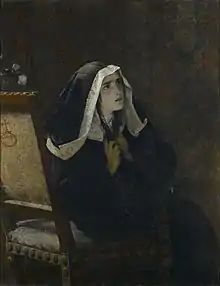 The Nun of Monza, 1865 (from the 1827 novel Promessi Sposi; The Betrothed)
The Nun of Monza, 1865 (from the 1827 novel Promessi Sposi; The Betrothed) Paris place de Clichy, 1884
Paris place de Clichy, 1884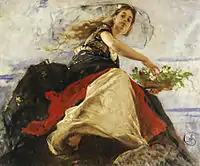 Flora, c. 1890
Flora, c. 1890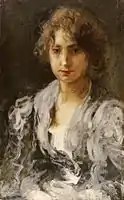 Portrait of a Lady, c. 1890
Portrait of a Lady, c. 1890 Vecchia Milano, Old Milano 1890
Vecchia Milano, Old Milano 1890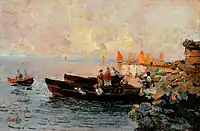 Lagoon at Sunset, c. 1893
Lagoon at Sunset, c. 1893 Washerwomen along the Canal (Naviglio), c. 1894-1899
Washerwomen along the Canal (Naviglio), c. 1894-1899 Woman in front of a Mirror c. 1900
Woman in front of a Mirror c. 1900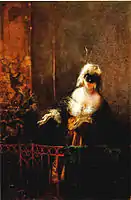 Carnaval in Venice c. 1910
Carnaval in Venice c. 1910
Works
- Gondola sul canale, oil on canvas, Accademia Carrara, Bergamo.
- A victim of the 17th-century (1863) Museo Civico, Brescia,
- Deposition, 1887 Cappella Visconti, Cimitère, Carnisio,
- Woman painter (1874); Carrobbio, Museo Raccolte Frugone at Villa Grimaldi-Fassio in Nervi, a frazione of Genoa,
- Frescoes, 1887 Villa San Fermo (or Giovanelli), Lonigo
- The sagra della vigilia, 1864; The Female letter-reader 1867; I fratelli al campo, 1867; The benedizione delle box, 1870 Interno rustico, Pinacoteca di Brera, Milan,
- Frescoes in Salotto Azzurro; Flora (1885), Palazzo Turati, Milan,
- Deposition, 1899, Cimitero Monumentale, Cappella Frova, Milan
- Frescos, Saletta Reale, Stazione Centrale, Milan
- Cleopatra, 1865; Portrait of Orsola Rebecchi(1875); Portrait of Luigi Galbiati (1876); Traversata, (1885); Snows in Milan (c. 1885); Il ritorno dalla sagra (1887); Fishermen of Chioggia (1890); The Washerwomen (1894); Sad Return (1897); Notturno, (c. 1898); Reminiscenze milanesi del 1848 1898 Busto di giovane donna, 1898 - 1899, Galleria d'Arte Moderna, Milan
- Portrait of Giulia Lucini Colombani (1894), Ospedale Maggiore, Milan
- Crucifixion, 1881 Diocesan Museum, Milan,
- Cavalcando; Pecore al ruscello; Scena rustic; Flora; Monache al lido; Donna col bambino al seno; Paolo and Francesca Pinacoteca Ambrosiana, Milan
- Lady of Monza (1865); Portrait of a Man (1875); The sorelle 1887, Museo Civico, Monza
- A street of Verona, Capodimonte Museum, Naples
- Resurrection (1874); Studio di testa, 1880; The paurose, 1881; Word of God 1887; Vaporino of Chioggia; Bosco nel Parco di Monza, 1895 Galleria Nazionale d'Arte Moderna, Rome,
- The Communion of St Louis Gonzaga (1864) Church Santa Maria Nascente and S. Carlo, Sant'Albino,
- It pittore Londonio, 1866; The lover Egidio, 1867; La Monaca di Monza, 1867 Galleria d'arte moderna, Turin
- The bufera, tempera on cardboard, Museo Revoltella, Trieste
- Crucifixion (1879), parish church S. Antonio Abate, Valmadrera,
- Portrait of a Lady c. 1898, Museo di Castelvecchio, Verona,
- Sanctuary of the Blessed Virgin of the Miracles, Corbetta
- Portrait of Simonetta Galimberti (1861)
- Portrait of Giacinta Galimberti (1861)
- After the Duel (1866)
- In Monza Cathedral (1872)
- Portrait of a Man (1875)
- Portrait of Giuseppe Antonio Fossati (1875)
- La storia (1877)
- Stemma sabaudo it Genio di Savoia (1883-1884)
- The spesa del Curato, (1885)
See also
References
- Laura Casone, Mosè Bianchi, online catalogue Artgate by Fondazione Cariplo, 2010, CC BY-SA (source for the first revision of this article).
- ↑ Dizionario degli Artisti Italiani Viventi: pittori, scultori, e Architetti., by Angelo de Gubernatis. Tipe dei Successori Le Monnier, 1889, page 56-57.
Other projects
![]() Media related to Mosè Bianchi at Wikimedia Commons
Media related to Mosè Bianchi at Wikimedia Commons
